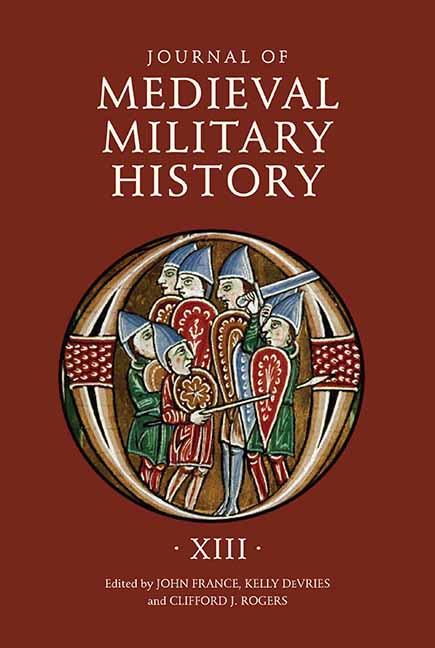Book contents
- Frontmatter
- Contents
- List of Illustrations and Table
- 1 Feudalism, Romanticism, and Source Criticism: Writing the Military History of Salian Germany
- 2 When the Lamb Attacked the Lion: A Danish Attack on England in 1138?
- 3 Development of Prefabricated Artillery during the Crusades
- 4 Some Notes on Ayyūbid and Mamluk Military Terms
- 5 Helgastaðir, 1220: A Battle of No Significance?
- 6 Por La Guarda De La Mar: Castile and the Struggle for the Sea in the Thirteenth and Fourteenth Centuries
- 7 The Battle of Hyddgen, 1401: Owain Glyndŵr’s Victory Reconsidered
- 8 The Provision of Artillery for the 1428 Expedition to France
- 9 1471: The Year of Three Battles and English Gunpowder Artillery
- 10 “Cardinal Sins” and “Cardinal Virtues” of “El Tercer Rey,” Pedro González de Mendoza: The Many Faces of a Warrior Churchman in Late Medieval Europe
- 11 Late Medieval Divergences: Comparative Perspectives on Early Gunpowder Warfare in Europe and China
- List of Contributors
- Journal of Medieval Military History 1477–545X
- De Re Militari and the Journal of Medieval Military History
2 - When the Lamb Attacked the Lion: A Danish Attack on England in 1138?
Published online by Cambridge University Press: 25 May 2021
- Frontmatter
- Contents
- List of Illustrations and Table
- 1 Feudalism, Romanticism, and Source Criticism: Writing the Military History of Salian Germany
- 2 When the Lamb Attacked the Lion: A Danish Attack on England in 1138?
- 3 Development of Prefabricated Artillery during the Crusades
- 4 Some Notes on Ayyūbid and Mamluk Military Terms
- 5 Helgastaðir, 1220: A Battle of No Significance?
- 6 Por La Guarda De La Mar: Castile and the Struggle for the Sea in the Thirteenth and Fourteenth Centuries
- 7 The Battle of Hyddgen, 1401: Owain Glyndŵr’s Victory Reconsidered
- 8 The Provision of Artillery for the 1428 Expedition to France
- 9 1471: The Year of Three Battles and English Gunpowder Artillery
- 10 “Cardinal Sins” and “Cardinal Virtues” of “El Tercer Rey,” Pedro González de Mendoza: The Many Faces of a Warrior Churchman in Late Medieval Europe
- 11 Late Medieval Divergences: Comparative Perspectives on Early Gunpowder Warfare in Europe and China
- List of Contributors
- Journal of Medieval Military History 1477–545X
- De Re Militari and the Journal of Medieval Military History
Summary
In the continuation of Sigebert of Gembloux's Chronicon sive Chronographia the anonymous continuator noted on the year 1138:
When the king of the Danes heard that the king of the English was dead he gathered many ships and an army of knights and footmen and ravaged the borders of England in a most cruel manner, saying that due to his ancestors’ hereditary right and <sc. the two kingdoms’> close connection via the sea between them he had a greater claim to the throne of England than king Stephen and the Normans who had acquired it through William the Bastard's invasion. Considering that it would be dangerous to meet such a fierce enemy head on in an unequal battle the king of the English held back and waited for an advantageous moment and when they had dispersed their forces far and wide gaping at the easy plunder, he defeated them in a battle, killed and captured many of them and forced the rest to go home in disgrace.
This attack is not mentioned in any English or Danish contemporary sources, and to my knowledge only three modern historians, Frederik Schiern writing in 1860, John Beeler in 1966 and finally Peter Sawyer in 1995, have taken note of it. Schiern lauded the attack, whereas Beeler mentioned it in a footnote and mostly as a curiosity and Sawyer – also in a footnote – flatly refused that the attack had taken place, since it was not mentioned in any other source. Apart from these I have found no mention of this attack in either English or Danish modern historiography. The Stand der Forschung on Anglo-Danish relations in the twelfth century can therefore be summarized by the following quotation:
The last expedition against England was prepared in 1085 and came to nothing when the Danish King Canute IV was murdered in 1086. After that, Danish military activity concentrated upon the Baltic area. A border became fixed between Denmark and England. It is difficult to understand solely in political terms. England after the conquest in 1066 became a strong, centralized state, but it was not so in the early twelfth century – at times during Henry I's reign, and especially under King Stephen – when [the] Danish kings expanded militarily elsewhere, but seem to have given up [on] England.
- Type
- Chapter
- Information
- Journal of Medieval Military HistoryVolume XIII, pp. 27 - 50Publisher: Boydell & BrewerPrint publication year: 2015
- 32
- Cited by



